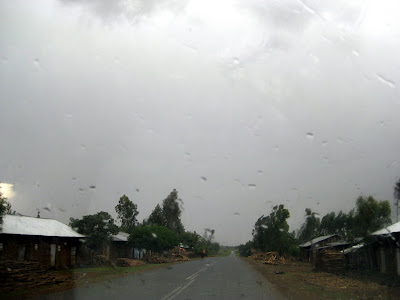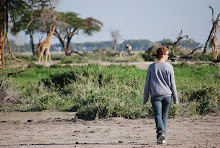Since arriving back in Dangila after traveling in mid-June there has yet to be a day without rain. Some days the rain comes in the form of simple afternoon showers and others it pours hard enough to flood nearby fields. Every town seems to have its own pattern and therefore each PC volunteer has his or her own stories about how to deal with the rainy season. It is fun to get together and hear about each person’s schedule for dodging the rain.
Dangila rainstorms have a tendency to arrive in the afternoon for about an hour and then they show up again right after dinnertime and into the night. I personally think the rainy season is a great change and I love the cool air at night. When I wake up each morning, the sky is already hazy and black clouds can be seen in the distance. Around lunchtime, there are usually a few spots of blue sky peaking out from behind the clouds on one side of town, but in the opposite direction, the dark rain clouds are waiting in the distance. Sometime around 1:30pm the first rain storm usually hits. I know this is the average time because two days a week I meet my tutor at 1:30pm, meaning I always take a gamble leaving my house at 1:15pm to walk over to the preparatory school, where we meet. When the lingering black clouds roll closer to town people start to close up shop windows and hurry to get where they are going, in order to avoid being stuck in the middle of the storm. I usually hesitate walking to tutoring as I watch the rains move closer to town, but I also usually take the risk and head out to join the people hustling around the streets.
Almost like clockwork, I will arrive at the school and get inside within minutes of the heavy rains arriving. One unfortunate day Mother Nature’s timing was a little off. As I walked the last long stretch of road to the school, with the entrance barely in sight, I watched people walking in the distance begin to scatter. I felt the heavy drops beginning to fall as I pulled the hood of my raincoat over my head. I could see the sheet of rain coming down the road toward me. I could hear the noise of rain pounding on metal roofs along the road picking up rhythm. Taking in my surroundings, I realized there were no
shops or restaurants on this final stretch to take cover. Knowing that once the rains start, they continue for about an hour, and I didn’t want to be stuck beneath a random tree, so I took off running!
I arrived soaked from head-to-toe, mud splattered to my knees, hair matted to my head even beneath the hood of my rain jacket. My tutor arrived a few minutes after me in a similar fashion, saying he was waiting it out nearby and saw me running. A couple hours later, I was semi-dry and slightly more enlightened about Amharic. I am slowly learning to watch the clouds and I am becoming more accurate with my predictions of the beginning of the storm, but every now and then I still get stuck in random cafes or shops, which have proven to be little adventures of their own. I also must add that I love falling
asleep to the storm pounding on my metal roof. Rainy season certainly has some negative aspects, like the dirt roads becoming mudslides, or clothes, which take days to dry on the line, but the rains also bring lots of reading/hot cocoa afternoons, and plenty of adventures.
Dangila rainstorms have a tendency to arrive in the afternoon for about an hour and then they show up again right after dinnertime and into the night. I personally think the rainy season is a great change and I love the cool air at night. When I wake up each morning, the sky is already hazy and black clouds can be seen in the distance. Around lunchtime, there are usually a few spots of blue sky peaking out from behind the clouds on one side of town, but in the opposite direction, the dark rain clouds are waiting in the distance. Sometime around 1:30pm the first rain storm usually hits. I know this is the average time because two days a week I meet my tutor at 1:30pm, meaning I always take a gamble leaving my house at 1:15pm to walk over to the preparatory school, where we meet. When the lingering black clouds roll closer to town people start to close up shop windows and hurry to get where they are going, in order to avoid being stuck in the middle of the storm. I usually hesitate walking to tutoring as I watch the rains move closer to town, but I also usually take the risk and head out to join the people hustling around the streets.
Almost like clockwork, I will arrive at the school and get inside within minutes of the heavy rains arriving. One unfortunate day Mother Nature’s timing was a little off. As I walked the last long stretch of road to the school, with the entrance barely in sight, I watched people walking in the distance begin to scatter. I felt the heavy drops beginning to fall as I pulled the hood of my raincoat over my head. I could see the sheet of rain coming down the road toward me. I could hear the noise of rain pounding on metal roofs along the road picking up rhythm. Taking in my surroundings, I realized there were no
shops or restaurants on this final stretch to take cover. Knowing that once the rains start, they continue for about an hour, and I didn’t want to be stuck beneath a random tree, so I took off running!
I arrived soaked from head-to-toe, mud splattered to my knees, hair matted to my head even beneath the hood of my rain jacket. My tutor arrived a few minutes after me in a similar fashion, saying he was waiting it out nearby and saw me running. A couple hours later, I was semi-dry and slightly more enlightened about Amharic. I am slowly learning to watch the clouds and I am becoming more accurate with my predictions of the beginning of the storm, but every now and then I still get stuck in random cafes or shops, which have proven to be little adventures of their own. I also must add that I love falling
asleep to the storm pounding on my metal roof. Rainy season certainly has some negative aspects, like the dirt roads becoming mudslides, or clothes, which take days to dry on the line, but the rains also bring lots of reading/hot cocoa afternoons, and plenty of adventures.


















